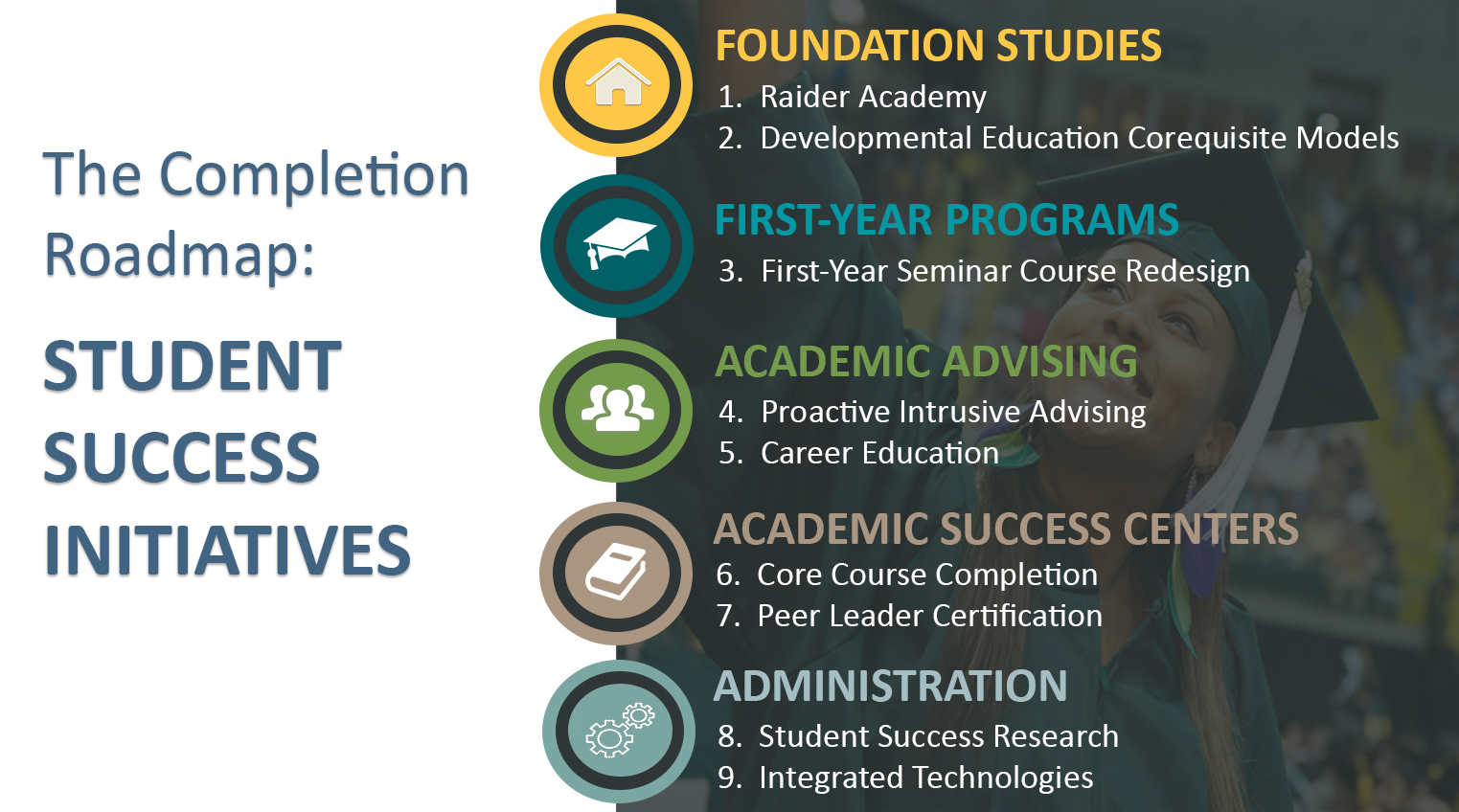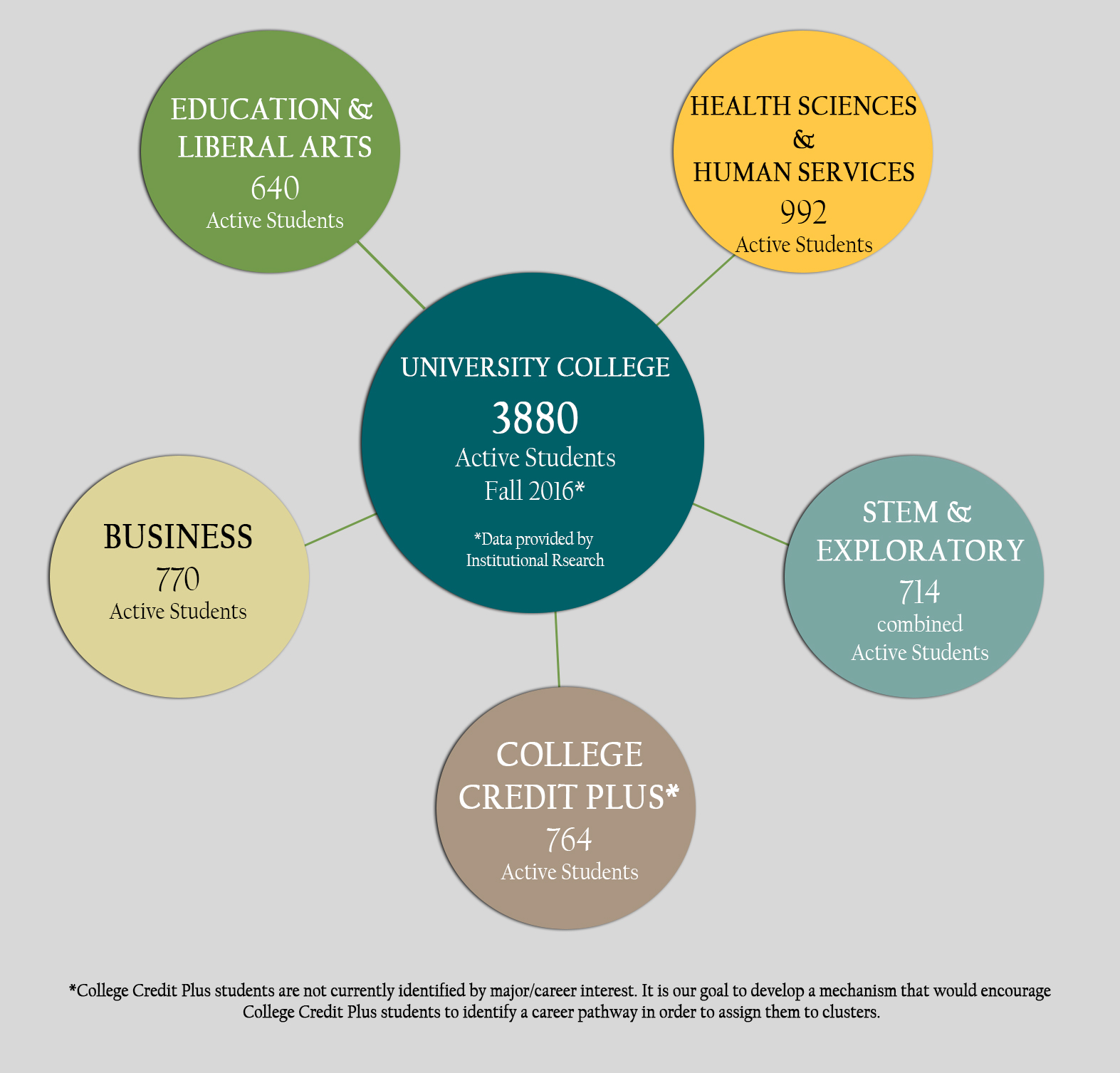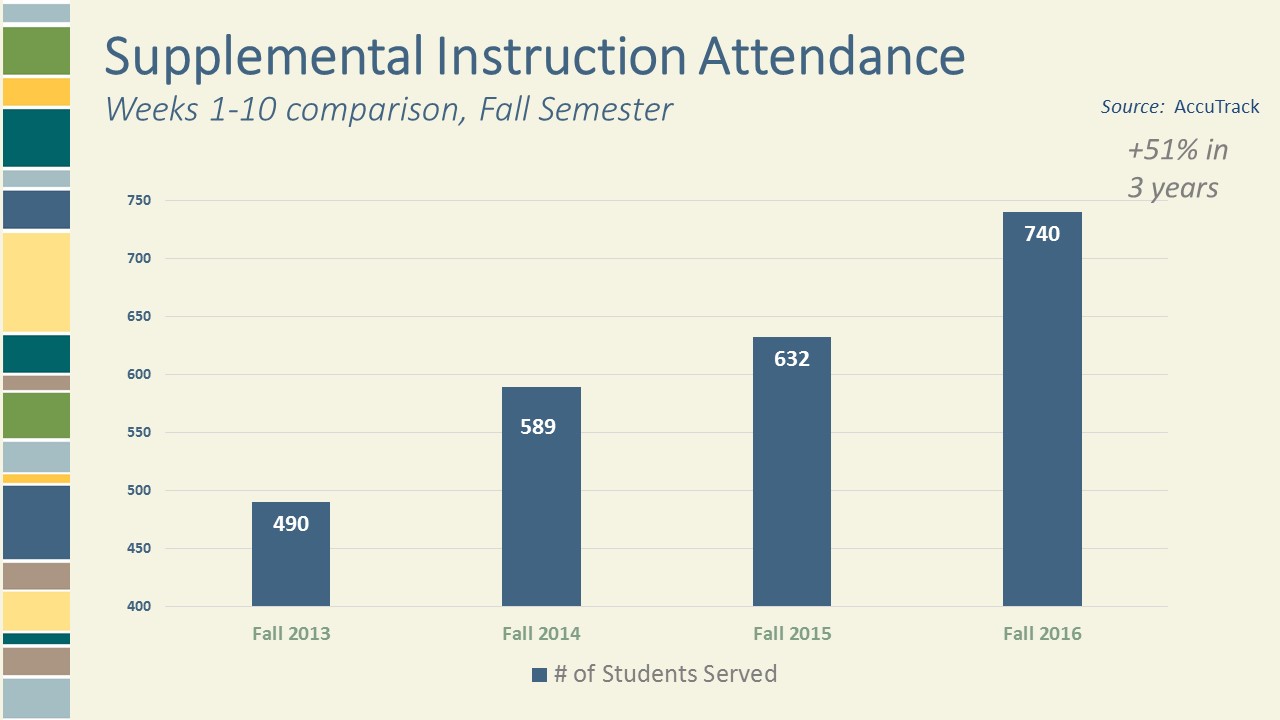University College Spring 2017 Newsletter

Table of Contents
From Dr. Sudkamp
Completion Roadmap: Student Success Initiatives
Advising Career Clusters
Success in Supplemental Instruction
Increasing Pass Rates with English Composition Co-Requisite
From Dr. Sudkamp

Amidst the changes we're all experiencing, our focus remains on the success of the students we serve. In 2016, we launched comprehensive Student Success Initiatives. This multi-tiered plan encompasses faculty, advisors, facilities, and technology to make significant progress toward increasing retention and graduation rates. These strategic initiatives are designed to:
1. Create a culture of high expectations
2. Provide wrap-around academic and social support for students throughout their academic careers
3. Redesign courses and curricula to support high impact practices to engage students
University College supports the students, faculty, and staff of degree-granting colleges through programs and services in academic advising, academic success centers, foundation studies, and first-year programs. Our mission is to provide ongoing academic support to all undergraduate students throughout their college career at Wright State University while developing the foundations for civic engagement and lifelong learning.
The Completion Roadmap of Student Success Initiatives outlines key objectives University College continues to work towards in the areas of Foundation Studies, First-Year Programs, Academic Advising, Academic Success Centers, Research, and Technology. The end of Spring 2017 marks continued achievements toward the developmental education co-requisite models with the introduction of the Accelerated Learning Program (ALP) for remediation in math, combined academic and career cluster advising incorporating career planning with major selection, and successful growth in course support through Supplemental Instruction.
Integrated technology is also an important part of the student success initiatives at Wright State. The Raider Academic Progress System (RAPS), built on the EAB Student Success Collaborative platform, has been an essential tool for advisors in their work with students. RAPS helps advisors provide students with academic risk assessment and career exploration, enhances communication, and integrates multiple sources of information to provide a holistic view of student activities and engagement.
As we face the challenges ahead, I encourage everyone to keep in mind the value of the services we all provide in improving the lives of our students and community.
Completion Roadmap: Student Success Initiatives

Advising Career Clusters
The University College Career Cluster Advising model is designed to help students define their talents, interests, and values while connecting them with career advisors who will help support them in their career and academic pursuits. Creating Career Cluster Advising is part of our commitment to improving student persistence, retention, movement to major and course completion through optimizing support in an integrated advising model that focuses on academic success and career goal achievement.
 The Ohio Department of Higher Education (ODHE) has a mandate to “establish statewide guaranteed transfer pathways from two-year to four-year degree programs in an equivalent field” by December 2018. The goal is to make degree programs more affordable to students and to increase persistence to degree completion. In response to the mandate, ODHE has developed “clusters (meta-majors) with associated specific majors within each cluster.”
The Ohio Department of Higher Education (ODHE) has a mandate to “establish statewide guaranteed transfer pathways from two-year to four-year degree programs in an equivalent field” by December 2018. The goal is to make degree programs more affordable to students and to increase persistence to degree completion. In response to the mandate, ODHE has developed “clusters (meta-majors) with associated specific majors within each cluster.”
The clusters model developed by ODHE serves as the underpinning for the Wright State University Career Cluster Advising Model. ODHE emphasizes the importance of advising services and academic support services to effectively implement clusters. At Wright State, clusters integrate academic advising and career advising to provide broader levels of support to students that extend beyond the silos of academic advising and career advising.
The Education Advisory Board (EAB) research on Careers & Student Success found that success gains can be realized with a “Cross-Functional Advising Model” that encourages the collaboration and coordination of wrap-around academic advising services and career advising services.
Each cluster has a team of two or three academic advisors and one advisor from the Career Center. Although students will have one academic advisor of record, the entire advising team will provide support for students in their cluster.
We are in the process of completing cluster assignments for students and developing outcomes that will measure the correlation of utilizing the Career Cluster Advising model and movement to major data.
We believe our partnership with the Career Center will allow us to provide increased and innovative services to our students and we look forward to the Fall 2017 launching of the Career Cluster Advising model at Wright State University!
Success in Supplemental Instruction
If you could improve your students’ grades by half a letter grade on average for minimal additional effort, would you do it? Thirty-seven faculty members teaching 75 different classes said, “yes” when they asked Tutoring Services to provide Supplemental Instruction (SI) for their classes this past Fall semester.
 Pioneered at the University of Missouri-Kansas City (UMKC), SI is a high impact practice that has spread throughout higher education. Employing peer SI leaders, “SI sessions are regularly scheduled, informal review sessions in which students compare notes, discuss readings, develop organizational tools, and predict test items” (info.umkc.edu/si/). According to UMKC’s International Center for Supplemental Instruction website, data gathered since 1973 has consistently demonstrated that students attending regular SI sessions see a half to full letter grade improvement over their peers who do not attend sessions and experience an average of a 13% reduction in DFW rates.
Pioneered at the University of Missouri-Kansas City (UMKC), SI is a high impact practice that has spread throughout higher education. Employing peer SI leaders, “SI sessions are regularly scheduled, informal review sessions in which students compare notes, discuss readings, develop organizational tools, and predict test items” (info.umkc.edu/si/). According to UMKC’s International Center for Supplemental Instruction website, data gathered since 1973 has consistently demonstrated that students attending regular SI sessions see a half to full letter grade improvement over their peers who do not attend sessions and experience an average of a 13% reduction in DFW rates.
Students attending SI sessions at Wright State have seen similar results. In a study of students attending SI sessions in Fall 2015, students saw an average grade increase of .40 over their peers who did not attend sessions. In 23 of the 41 classes studied, the increase was .50 or better with 5 classes seeing an increase of a letter grade or more.
Our message to students is that taking advantage of academic support services like Supplemental Instruction isn’t what struggling students do; it’s what successful students do. Time spent in an SI session or with a tutor isn’t extra time; it’s the most effective use of the time you need to be spending outside of class.
The demands on a college student’s time are greater than ever. Few students believe they have the time to dedicate the traditional 3 hours outside of class for every class hour. They often see time spent with a tutor as “extra” time they don’t have. When, in fact, time spent with an experienced student, one who is qualified and trained to provide academic support, is actually the most effective use of their limited out-of-class time. The results that students attending SI sessions experience certainly support that argument.
Increasing Pass Rates with English Composition Co-Requisite
 Did you know on average a first-year student is expected to write up to 10 papers, totaling an estimated 47 pages*? And by senior year, the average increases to 13 papers for an estimated 77 pages**? Solid writing skills are critical to success across all programs.
Did you know on average a first-year student is expected to write up to 10 papers, totaling an estimated 47 pages*? And by senior year, the average increases to 13 papers for an estimated 77 pages**? Solid writing skills are critical to success across all programs.
The Student Success Initiative includes reducing time to graduation and increasing core course completion and overall student retention by providing co-requisite remediation in both English Composition and Math. Wright State has fully implemented co-requisite remediation in English Composition through the Accelerated Learning Program (ALP). In ALP students who would otherwise have taken a developmental composition course prior to taking ENG 1100, now enroll in the core course and co-enroll in a developmental support course.
In Fall 2016, nearly 200 students enrolled in ALP. Pass rates increased by 19% compared to the previous year, highlighting the value of this high-impact practice. ALP data indicates enhanced student performance when taking developmental courses concurrent with related credit-bearing coursework.
The co-requisite model in English Composition is another way we continue to provide innovative academic support and create a culture of high expectations for our students' success.
*Source: National Survey of Student Engagement (NSSE), 2015, of Wright State first-year and senior students.
**Estimate based upon calculation provided by NSSE
First-Year n=342; Senior n= 448

